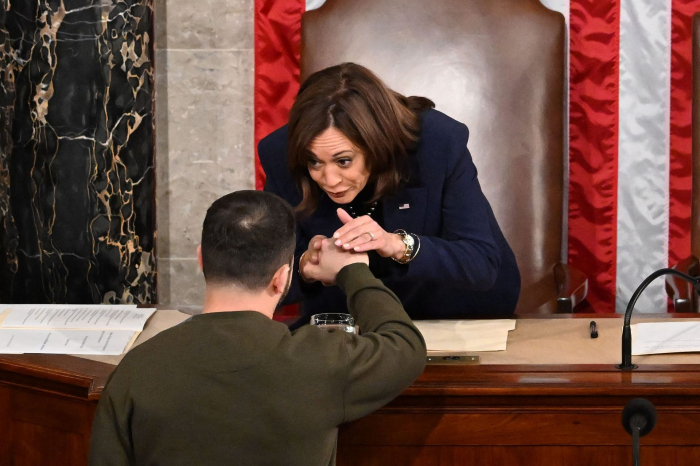By seeking to keep the issue of Ukraine off the campaign trail, Biden’s team has essentially allowed Trump to frame the narrative around any future peace agreement.
“Kamala Harris, the U.S. presidential candidate” seems to have shut down many of the reservations that her Democratic Party and plenty of observers had regarding “Kamala Harris, the vice president.” Of course, only time will tell if this is simply the result of a post-President Joe Biden honeymoon, or the actual reality of a politician now freed from the shadow of the president’s office and team.
The very same question hangs over the biggest legacy foreign policy issue of Biden’s presidency as well: the war in Ukraine.
Many on the Democrat side argue there’s nothing fundamentally wrong with Biden’s Ukraine policy. On the contrary, his advisors and supporters explain that he’s stayed true to his initially stated goal of supporting Ukraine for as long as it takes, while avoiding a direct conflict with Russia.
Staying true to a strategy doesn’t guarantee its success, however. And while Biden has managed to lead a broad international coalition in support of Ukraine, looking at the situation on the battlefield, the limits of this cautious approach are now becoming clear — notwithstanding its incursion across the border into Russia, Kyiv is losing ground, both literally and figuratively.
Thus, continuing Biden’s balancing act means that a point of failure is coming, either before or after a painful peace deal with Russia, which is still aiming to undermine a sovereign and independent Ukraine.
Another suboptimal result of the cautious Biden doctrine is that U.S. policy on Ukraine has been increasingly dictated from former U.S. President Donald Trump’s camp in Mar-o-Lago — not Washington itself. It was Trump who hijacked and delayed a vote in the U.S. Congress to pass supplemental aid for Ukraine. And now, it’s Trump and his advisors who are again steering the conversation on how and when the war should end.
By seeking to keep the issue of Ukraine off the campaign trail, Biden’s team has essentially allowed Trump to frame the narrative around any future peace agreement.
So, with Harris’s nomination now assured, the Democrats must reassert their control over America’s Ukraine policy — one that, if it is to succeed, must make clear that this war will only be brought to a favorable end through strength.
For example, Harris needs to signal her willingness to lift the remaining caveats on the use of Western-supplied long-range weapons against military targets within Russia, as well as those on deploying NATO country trainers to Ukraine.
Up until now, Biden’s hesitancy has allowed Russia to escalate the conflict at limited cost. Harris, for her part, must indicate that she won’t allow Russian President Vladimir Putin to set the terms of war. And to this end, she could propose a new approach where NATO countries willing to do more could do so. For example, she could signal U.S. support for allies shooting down Russian missiles or drones in close vicinity to their territory as acts of self-defense — a move that wouldn’t mean NATO entering the conflict directly, but one that would step away from Biden’s narrow interpretation of NATO’s interests and the alliance’s role in supporting Ukraine.
A new Harris plan could also address a big grievance among Republicans: that Europeans are still doing far too little. And to this end, lifting these most restrictive caveats and showing U.S. support would open the way for more forward-leaning European allies — such as France, the U.K., the Nordics, the Czech Republic, Romania and Poland — to take more calculated risks in support of Ukraine.
While Biden has managed to lead a broad international coalition in support of Ukraine, looking at the situation on the battlefield, the limits of this cautious approach are now becoming clear. | Genya Savilov/AFP via Getty Images
We are at a critical moment that’s calling out for a new approach. Ukraine needs to strengthen its position before any possible peace negotiations, while Trump has implausibly promised to end the war in one day. Amid all this, Harris could start defining her own, more realistic strategic bargain — a plan that should demonstrate Ukraine and its European allies can assure the bulk of the forces needed to defend Ukraine, with the U.S. providing a smaller but still indispensable share.
For example, she could state that if Europe steps up and develops a credible defense investment and readiness plan for the next five years to defend Ukraine, the U.S. will support extending an invitation for Ukraine to join NATO.
Some in the Democratic Party will disagree with this approach, arguing now is the time to keep a low profile on Ukraine — this was, after all, the line taken throughout the spring, ahead of the NATO Summit. But that approach not only failed to bring the party any positive impact in the polls, it also allowed Trump to seize the narrative on Ukraine, while giving Putin time to strengthen his position on the battlefield.
As we move closer to peace negotiations, Harris has the chance to strengthen Ukraine’s hand and show that European allies will do the bulk of the heavy lifting. And that wouldn’t just be good for Ukraine, it would be good for her chances of winning the White House too.
Fabrice Pothier is the CEO of Rasmussen Global.
More about:
















































